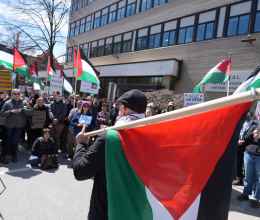
Mayor Walsh, let’s build our own wall—to protect Bostonians from Trump
By Kade Crockford, director of the ACLU of Massachusetts Technology for Liberty Project
Six days after President Trump’s inauguration, Boston Mayor Marty Walsh held a press conference at City Hall, announcing to the world that Boston was and would remain a friend to immigrants. He said the city “will continue to foster trusting relationships between law enforcement and the immigrant community… and will not waste vital police resources on misguided federal actions."
But despite the rhetoric, a year later, Boston is still not doing enough to protect immigrants and other vulnerable residents from the Trump administration. The city can and must do more.
A new report co-published by the Century Foundation and the ACLU of Massachusetts offers concrete policy proposals for progressive cities like Boston. If cities really want to guarantee “sanctuary” for their residents, they must be willing to throw sand in the gears of the federal deportation machine – and progressive city leaders must back up their promises with policy.
Mayor Walsh’s record on this front is good, but not unblemished.
Last month, the Walsh administration and the Boston Police Department (BPD) faced criticism from advocates, including the ACLU, over its handling of information in the city’s gang assessment database. A young immigrant from East Boston now faces deportation because the Boston Regional Intelligence Center – a “fusion center” staffed by Boston Police and federal agents – told Immigration and Customs Enforcement (ICE) he was a gang member. His lawyer says nothing could be farther from the truth, and that her client was wrongfully accused by the BPD.
It’s bad enough to be wrongly labeled a gang member by a local cop, but when the Department shares information like this with ICE, it can have devastating and potentially life-threatening consequences for young people. The city’s response to the controversy was muted, and despite Mayor Walsh’s promise to protect Boston’s immigrants, the Department has not pledged to change the way it shares information with federal immigration authorities.
Part of the problem is that current BPD policy allows officers and analysts to collect, retain, and share with federal agencies information about people even when they are not suspected of engaging in any criminal activity.
This misguided BPD policy doesn’t just harm immigrants. In 2012, the ACLU and the National Lawyers Group published BPD documents revealing extensive surveillance of anti-war groups, labeling the activists as “extremists.” More recently, the BPD secretly used a social media surveillance tool to monitor online speech related to people’s religious and political affiliations.
These types of surveillance in collaboration with with federal authorities don’t just violate civil rights and civil liberties; they also undermine community trust in local law enforcement, a key reason progressive mayors like Mayor Walsh call on when highlighting the importance of separating local cops from Trump’s immigration enforcers.
To turn promises into policy, Mayor Walsh should work to ban the collection of information about people engaged in First Amendment protected activity, unless they have specific reason to believe the person is involved in serious crimes.
He should also follow San Francisco’s lead and sever ties with the FBI’s Joint Terrorism Task Force (JTTF). BPD officers working on the Boston JTTF may be engaging in practices the FBI endorses, but that Bostonians should roundly reject – like racial and religious profiling. During his confirmation hearings last year, FBI Director Wray refused to say that he would bar agents from infiltrating mosques, even if agents had no reason to believe there was criminal activity occurring inside them. That type of biased and discriminatory conduct should find no quarter in Boston.
Walsh should also encourage BPD to review the gang databasing system itself to determine how frequently it is improperly identifying young people of color as gang members, simply because of where they live or whom they know. When the mayor of Portland, Oregon took a look at his city’s gang database, he discovered 81 percent of the people in it were people of color. To rebuild trust with those communities, he shut the database down for good. That kind of leadership should be a model for Boston.
Finally, Mayor Walsh should welcome with open arms efforts at the City Council to establish a local ordinance requiring city agencies, including BPD, to go through a transparent, democratic, public process before acquiring new surveillance technologies. If history is any lesson, these tools will inevitably be used to disproportionately target communities of color, including immigrant communities.
People who care about justice and equality are grateful for Mayor Walsh’s efforts to make immigrants feel at home in Boston. But we can do much more, and in the process also expand civil rights and civil liberties protections for citizens. We must reject the Trump administration’s bigotry, racism, and hatred; to do that, we must build our own wall – in the form of concrete policies, ordinances, and procedures – to protect our communities from federal harm.
Related content

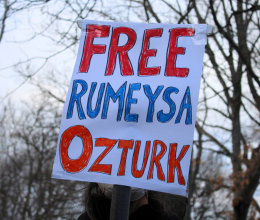
Appeals Court to Consider Stay of Rümeysa Öztürk’s Transfer to Vermont
April 29, 2025APHA v. NIH
April 24, 2025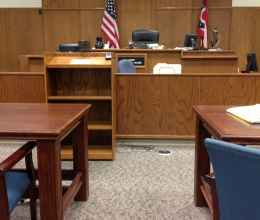
Federal Court Grants Preliminary Injunction Against Department of...
April 24, 2025
Court Rules Rümeysa Öztürk’s Lawsuit Should Move Forward in Vermont...
April 18, 2025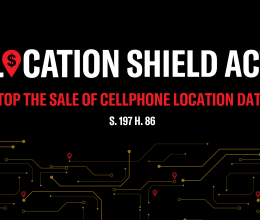
Advocates, experts call on lawmakers to ban sale of location data
April 9, 2025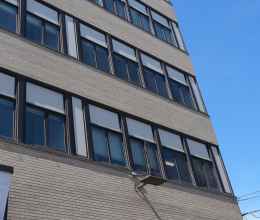
Court Rules Rümeysa Öztürk’s Lawsuit Should Move Forward in Vermont
April 4, 2025